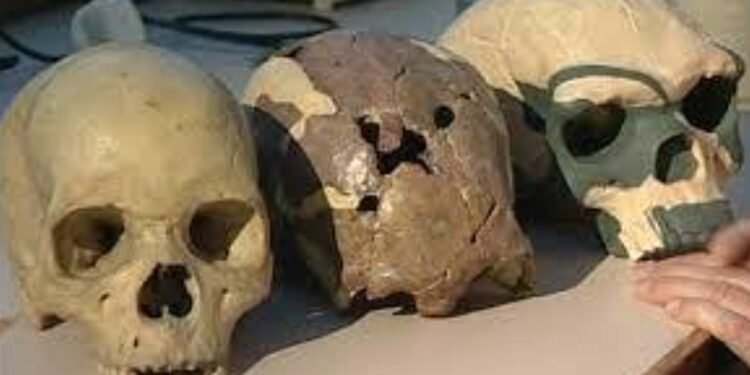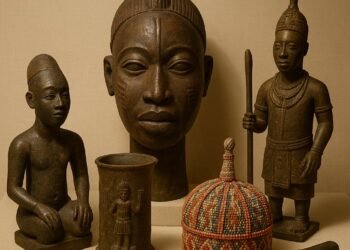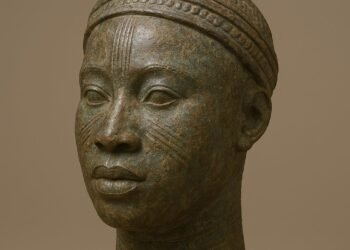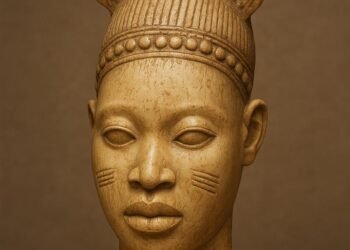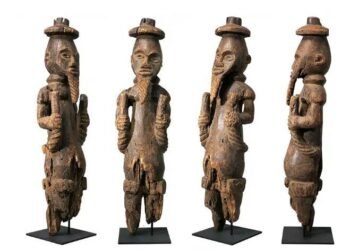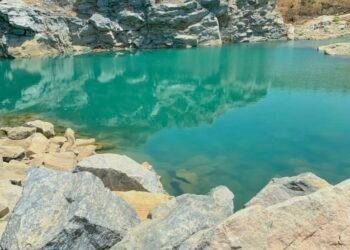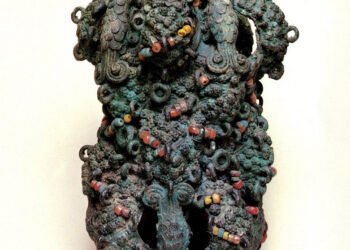Iho Eleru Skull: Mysterious Human Fossil Found in Nigeria Cave
Concealed deep within a Nigerian rock shelter, a discovery rested quietly upon a pillar of human evolution. The story of the Iho Eleru skull, an unaccommodating 13,000-year-old artifact, unfolds.
Its presence shatters the tidy chronology of our species’ evolution. The remainder of the world was occupied by modern humans, but this West African individual had archaic, ancient characteristics.
This skull is not a fossil in itself; it is a profound suggestion of a missing page in our shared history, evidence of a more complex and richer human story in Africa that we are only now beginning to appreciate.
Table of Contents
Iho Eleru Skull Site
The story begins not with a team of famous paleoanthropologists, but with a local chief surveying the land. In 1961, Chief Officer J. Akeredolu first noted the promising rock shelter near the village of Isarun.
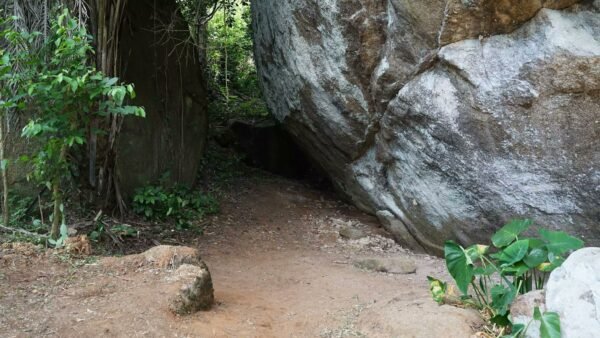
Read Also: Iyake Lake: Nigeria’s Breathtaking Hidden Natural Wonder
It was not until 1965, however, that the whole excavation was begun by the renowned archaeologist Thurstan Shaw. His team carefully searched through layers of the past, unearthing more than half a million Later Stone Age stone tools.
Their most stunning find was a human skeleton, deliberately buried in a flexed position deep within the ash-laden floor. The skull, though fragmented, was the crown jewel of the discovery.
A Face from the Deep Past in a Skull
When the scientists reconstructed the cranium, they were presented with a bewildering puzzle of details. The man was a vigorous male, likely in his thirties, and had lived an active life. His skull itself presented a conflicting image.
While definitely human, it was not in the same rounded, globular shape as modern Homo sapiens. It had a low and elongated vault with a moderately recessed brow and forehead ridges that gave it a more archaic appearance.
His face must have been less characteristic, and his jaw robust but not pointed. It was not a typical prehistoric burial but an insight into an unexpected and profound page of our history.
Pinpointing an Ancient Timeline
Pinpointing the skull’s actual age became a decades-long scientific quest. Initial radiocarbon dating of nearby charcoal suggested it was 13,000 years old, already a remarkable age.
But scientists needed certainty. They returned to the more precise method of Uranium-Thorium dating and applied it directly to the bone fragments themselves.
Read Also: The Owu Wall: Ancient Fortress of Nigeria’s Yoruba Kingdom
These results were stunning, bringing the timeline even deeper into the past, to between 11,700 and 16,300 years ago. It was this confirmation that unlocked the mystery. It literally showed that this old-looking man wandered around West Africa when the rest of the world was inhabited by human beings who looked just like us. Its greatest surprise was how youthful it looked.
A Snapshot of Daily Life
The Iho Eleru rock shelter was a seasonal camp, a familiar stop for a group of hunter-gatherers traversing their ancient landscape. It was not a permanent village, but the sheer volume of discarded stone tools tells us their visits were frequent and involved intensive activity.
The floor of the shelter acts as a scrapbook of their meals, preserving bones from their hunts. Their survival testified to pragmatism and deep knowledge of their world. They hunted dwarf antelope and bushpigs successfully, but they could also scavenge from smaller game, such as giant pouched rats and turtles.
Above all, they grind Canarium schweinfurthii nuts, an entrepreneurial activity that marks a resourceful, refined subsistence strategy. This was not a mere struggling-to-survive type of group; they were able to thrive in a harsh world.
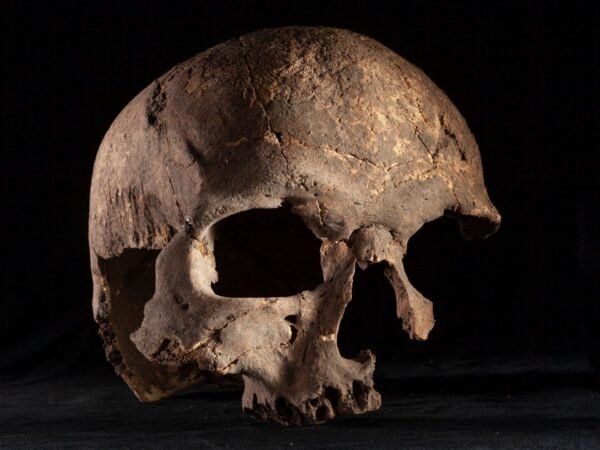
Why Iho Eleru Shakes the Family Tree
The absolute magnitude of Iho Eleru lies in its mind-boggling age. For generations, the standard theory was that anatomically modern humans had fully evolved in Africa at least 100,000 years ago and ultimately replaced all the other archaic populations.
Read Also: The Great wall of Benin: Nigeria’s Forgotten Ancient Marvel
Iho Eleru dispels that simplicity. There was at least one, just 13,000 years ago, who had unmistakable archaic characteristics in his skeleton. That implies that the African evolution of modern humans was not a single, rapid process, but a complex, drawn-out one.
Different populations may have had slightly different histories, with some relict populations maintaining older characteristics for much longer than anyone had imagined.
Unanswered Questions That Linger
For all its profound implications, the Iho Eleru skull is more valuable for the questions it raises than the answers it provides. Its true identity remains its most profound secret.
Does this individual represent a lost lineage, a final survivor of a much older human species that found its last refuge in West Africa? Or does its blended anatomy tell a different story, one of interaction and interbreeding between our modern human ancestors and a separate, archaic population that had called the region home for millennia?
The bony architecture of the skull whispers these tantalizing possibilities but holds the truth close. Without more evidence, this singular fossil cannot choose between these narratives, leaving us with a captivating and unresolved mystery.
Iho Eleru Skull Facts
Science often turns to ancient DNA to solve such mysteries, much like it did with the Denisovans in Siberia’s cold preserves. Here, West Africa’s climate presents a cruel twist of fate. The region’s relentless heat and humidity actively break down genetic material over millennia.
Despite numerous attempts, researchers have been unable to retrieve any usable DNA from the Iho Eleru bones. This creates a profound silence at the heart of the mystery.
We possess the compelling physical evidence of a different kind of human, but we are missing the definitive genetic story that could finally explain their place on our family tree. The answers are locked away, perhaps forever.
Read Also: Explore the Beauty and Culture of Igbara Oke
Iho Eleru Skull History
The relevance of Iho Eleru extends beyond academia. It is a sign that the history of humankind extends deeply into all corners of the African continent, not just the well-studied eastern and southern regions.
It advocates for African multiregionalism, a hypothesis that explains the entwined yet divergent lines of evolution across the continent. For West Africa and Nigeria, it is a colossal work of cultural legacy, a veritable link to an erstwhile past that is still being unlocked.

Iho Eleru Skull – A Race Against Time to Preserve History
The Iho Eleru shelter today faces a silent collapse, threatened by erosion and human activity. This invaluable window into our past risks fading away without greater protection.
Local community leaders and dedicated researchers have mobilized, vocally advocating for their heritage. They aspire to receive official state recognition and the necessary resources to save the site from further ruin.
An international response is underway, supported by a UNESCO World Heritage nomination. This designation would provide a crucial preservation context to prevent this pillar of human history from fading away and becoming a source of information and inspiration for generations to come. The fight goes on.
Iho Eleru Skull
The Iho Eleru skull is a forceful reminder that the tale of human evolution is yet unfolding. This is a tale of complexity, diversity, and surprising strength. This one skull, found by accident in a Nigerian cave, actually compels scientists to doubt everything they thought they knew about human history.
Read Also: A Guide To The Amazing Facts About Idanre Hills
It compels us to think of Africa not just as a place in an ongoing chain, but as a heterogeneous continent full of its own stories, each one waiting to be told. The ash cave revealed one of its secrets, but there undoubtedly are some secrets concealed within.
Iho Eleru Skull
